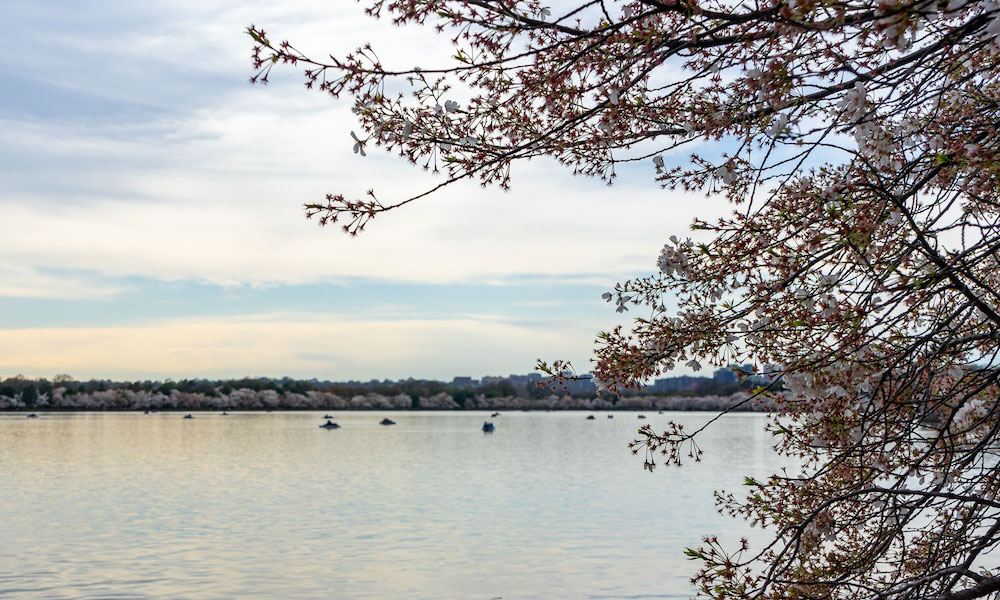JMU international students and faculty travel to Washington, D.C., for the 2024 Cherry Blossom Festival
News
At the end of March, a group of more than 30 JMU international students and faculty hopped on a bus and traveled to Washington, D.C., to experience the annual Cherry Blossom Festival. In Washington, D.C., the cherry trees are synonymous with the arrival of spring and serve as a reminder of a unique global relationship. For the JMU international community, this spectacle wasn’t just a sight to behold; it was cultural immersion, a celebration of diversity, and an opportunity to make unforgettable memories.
The cherry trees that surround the Tidal Basin are, themselves, a symbol of the cross-cultural bond between Japan and the United States. The history of the trees dates back more than a hundred years to 1912, when the governor of Tokyo gifted more than 3,000 trees to the United States as a token of goodwill between the two countries. The trees were planted in an elaborate ceremony that was attended by First Lady Helen Taft and the festival has become an important cultural tradition in the nation’s capital. The trees are a living reminder that the two countries share a rich heritage of friendship despite their differences.

 Every year, thousands of people from across the globe flock to the nation’s capital during the Cherry Blossom Festival to experience a wide range of activities. For many international students, this festival was a gateway to understanding American culture while connecting it to their own backgrounds. As they spent the day strolling along the National Mall and the Tidal Basin, they were surrounded by thousands of fellow visitors, sharing in a collective celebration of multiculturalism.
Every year, thousands of people from across the globe flock to the nation’s capital during the Cherry Blossom Festival to experience a wide range of activities. For many international students, this festival was a gateway to understanding American culture while connecting it to their own backgrounds. As they spent the day strolling along the National Mall and the Tidal Basin, they were surrounded by thousands of fellow visitors, sharing in a collective celebration of multiculturalism.
Among the JMU international students who went on this trip was Princy Patel, a CIS major from India who decided to go “because I wanted to meet new international students at the university so I can make new friends. I hadn’t been to DC before, so that made it more interesting to visit.” For her, the Cherry Blossom Festival represented more than just a weekend getaway — it was a cultural exchange where she was able to connect with other people in the international community at JMU and share a new experience beyond JMU’s campus.
In addition to students, several international faculty also joined the excursion. International faculty are an important and valuable asset to JMU, and this trip gave them a welcome break in the midst of a busy semester. Modjadji Choshi, an assistant professor in nursing, said, “I have been in Harrisonburg for five and half years and I have always wanted to see the cherry blossoms … This was a great opportunity to mix and mingle.” For Choshi and the other international faculty, the destination was not the only reason to attend; it was also about making connections with each other and exploring beyond Harrisonburg.

Group activities, like this trip to see the cherry blossoms, are organized by JMU’s International and Student Scholar Services team. They also organize an annual Thanksgiving meal, a trip to a local farm, hikes, lunches, trips to the grocery store, cookie parties and more. The goal of these events is to engage with the JMU international community by providing opportunities to meet one another, learn more about American culture and have a little fun in the process.
The international students and faculty who went to the Cherry Blossom Festival got a rare chance to strengthen their connection to the community and participate in a unique cultural event. The Cherry Blossom Festival is a particularly fitting event to attend, since it is historically about celebrating multiculturalism and international friendship. What the international students and staff experienced on this trip will be a foundational touchpoint of their time at JMU, and they will fondly remember the things they saw, the conversations they had and the community that made it all possible.
